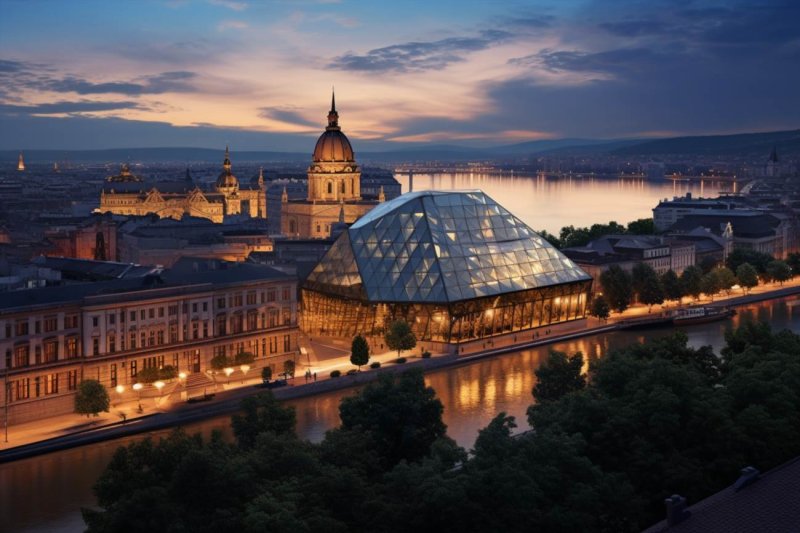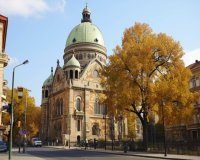Budapest’s Jewish Museums

Budapest's Jewish Museums: Exploring Rich Heritage and Culture
Budapest, the capital city of Hungary, is not only known for its stunning architecture and thermal baths but also for its rich cultural heritage. One of the significant aspects of Budapest's cultural tapestry is its Jewish heritage, which is beautifully preserved and showcased in its various Jewish museums.
The Jewish Museums of Budapest
Budapest boasts several Jewish museums that provide visitors with a glimpse into the history, traditions, and contributions of the Jewish community. These museums serve as important cultural landmarks, inviting locals and tourists alike to explore the Jewish heritage of the city.
Dohány Street Synagogue and the Hungarian Jewish Museum
At the heart of Budapest lies the Dohány Street Synagogue, one of the largest synagogues in Europe. Adjacent to the synagogue is the Hungarian Jewish Museum, which houses a remarkable collection of artifacts, documents, and artworks depicting the life of Hungarian Jews throughout history. Visitors can explore exhibitions detailing Jewish traditions, rituals, and the impact of the Holocaust on the Hungarian Jewish community.
Carl Lutz Memorial Museum
The Carl Lutz Memorial Museum is dedicated to the heroic actions of Carl Lutz, a Swiss diplomat who saved thousands of Hungarian Jews during World War II. The museum chronicles his life and showcases the efforts made to rescue Jews from persecution. It stands as a testament to human courage and compassion in the face of adversity.
Holocaust Memorial Center
The Holocaust Memorial Center in Budapest is a poignant tribute to the victims of the Holocaust, specifically focusing on the experiences of Hungarian Jews. Through multimedia exhibits, personal testimonies, and archival materials, the museum educates visitors about the atrocities committed during the Holocaust and the importance of tolerance and understanding in today's world.
Connecting with Budapest's Jewish Heritage
Exploring Budapest's Jewish museums offers a unique opportunity to connect with the city's diverse cultural heritage. Visitors can participate in guided tours, attend educational programs, and engage in discussions to gain a deeper understanding of the Jewish community's history and traditions.
Conclusion
Budapest's Jewish museums stand as symbols of resilience, remembrance, and cultural preservation. By delving into the exhibits and artifacts within these museums, visitors can gain valuable insights into the rich tapestry of Budapest's Jewish heritage, fostering a greater appreciation for the city's multicultural identity.
Budapest: The Great Synagogue Skip the Line Ticket
Explore the rich history and architectural marvels of Budapest's Great Synagogue, the largest synagogue in Europe and the second-largest in the world. With our skip-the-line ticket, delve deep into the heart of Jewish heritage in Hungary.
Overview
Discover the Great Synagogue's grandeur and significance, bypassing the ticket lines for a hassle-free entry. Dive into the history of Hungarian Jews before and after WWII, with a guided tour encompassing the Synagogue, Heroes’ Temple, Raoul Wallenberg Memorial Park, and the cemetery.
Details
Join a certified guide and learn about the fate of Hungarian Jews as you explore the Great Synagogue. Visit the Emmanuel Memorial Tree, an emblem of remembrance, and pay respects at the Raoul Wallenberg Memorial Park, honoring Holocaust victims. Delve into the Hungarian Jewish Museum to understand daily life through a collection of artifacts.
Highlights
Marvel at the Great Synagogue's grandeur, taking advantage of skip-the-line access. Explore the Synagogue’s surroundings, including the Heroes’ Temple and the poignant graveyard. Visit the Hungarian Jewish Museum to gain insights into Hungarian Jewish culture and history. Commemorate Holocaust victims at the Emmanuel Memorial Tree in the Raoul Wallenberg Memorial Park.
Meeting Point
Present your voucher directly at the security check at Dohány Street Synagogue.
Important Information
Before your visit, please note that the Synagogue is closed on Saturdays and during Jewish holidays. Visitors are requested to dress modestly, and men must cover their heads (kippahs are provided). Large backpacks are not allowed, and there's a security check upon entry. While face masks are recommended, they are not mandatory. The ticket office and entrance close one hour before visiting hours end.
Reviews
Experience the Synagogue through the eyes of fellow travelers. Visitors have praised the tour for its informative guides, offering insights into the history of Budapest, European Jewry, and the resilience of the human spirit. The tour, while deeply moving, is also noted for its hopeful ambiance, creating an enlightening experience for all.
However, some guests found the tour format less structured, with guides rotating between different groups, leading to varied experiences. Despite this, the impact of the Holocaust exhibition and the Synagogue's architectural beauty left a lasting impression.
History and Heritage of Budapest
Budapest, the capital of Hungary, is a city steeped in history and heritage. From its medieval roots to its modern-day vibrancy, Budapest has a rich and fascinating past that continues to shape its present. In this article, we will delve into the historical and cultural treasures that make Budapest a unique and captivating destination.
Medieval Origins
The history of Budapest can be traced back to ancient times, but its true rise to prominence began in the Middle Ages. The city was originally two separate settlements: Buda and Pest, divided by the majestic Danube River. Buda, perched on the hilly west bank, and Pest, on the flat east bank, developed independently for centuries.
In the 14th century, Buda became the capital of the Kingdom of Hungary, while Pest grew as a bustling trading center. The two cities were united in 1873 to form the modern metropolis of Budapest, but their individual histories are still evident in the architecture and layout of the city.
Architectural Marvels
Budapest is renowned for its stunning architecture, which reflects the city's diverse history. One of the most iconic landmarks is Buda Castle, a grand fortress perched on Castle Hill. The castle complex, with its medieval, Baroque, and Gothic elements, is a testament to the city's royal past.
Another architectural gem is the Hungarian Parliament Building, an imposing Neo-Gothic masterpiece along the Danube's banks. Its intricate façade and majestic dome make it one of Europe's most impressive legislative buildings.
St. Stephen's Basilica, a neoclassical cathedral, is another must-visit. Named after Hungary's first king, it houses valuable relics and offers panoramic views from its dome. Budapest's architectural splendors are a testament to its enduring heritage.
Thermal Baths and Spas
Budapest's heritage also includes a longstanding tradition of thermal baths and spas. The city sits atop a network of natural thermal springs, and these healing waters have been enjoyed by locals and visitors for centuries.
The Széchenyi Thermal Bath, housed in a grand Neo-Baroque building, is one of Budapest's most famous. Its outdoor pools are especially popular, even in the midst of winter. Gellért Baths, with its Art Nouveau design, is another beloved destination for relaxation and rejuvenation.
Cultural Crossroads
Throughout its history, Budapest has been a cultural crossroads, influenced by various civilizations. The city's Jewish Quarter, with its historic synagogues and vibrant street life, is a testament to its Jewish heritage.
Budapest also has a thriving arts scene. The Hungarian National Museum showcases the country's history and culture through its extensive collections. The Hungarian State Opera House is renowned for its acoustics and opulent interiors, offering world-class performances.
The Revolutions of 1956
One of the most significant chapters in Budapest's history is the Hungarian Revolution of 1956. It was a nationwide uprising against the Soviet-backed government, and Budapest was at the heart of the rebellion. The Hungarian people's quest for freedom and independence is commemorated with monuments and memorials throughout the city.
One such memorial is the 1956 Memorial Park, where visitors can learn about the events of the revolution and pay their respects to those who lost their lives in the struggle for freedom.
Conclusion
Budapest's history and heritage are as diverse and captivating as the city itself. From its medieval origins to its architectural marvels, thermal baths, cultural richness, and the resilience of its people, Budapest is a city that tells a story at every turn. Exploring its historical treasures is a journey through time, offering a deeper understanding of this enchanting European capital.
Budapest: Jewish Cuisine and Culture Walk
Experience Budapest’s Jewish food renaissance, taste traditional (and modern) dishes, and gain a deeper understanding of Hungary’s Jewish history and culture.
About this activity
Free cancellation. Cancel up to 24 hours in advance for a full refund. Reserve now & pay later. Keep your travel plans flexible — book your spot and pay nothing today.
Covid-19 precautions
Special health and safety measures are in place. Check your activity voucher once you book for full details.
Duration: 4 hours
Experience Highlights
- Enjoy a culinary and cultural walking tour of Budapest’s old Jewish quarter with an expert guide
- Explore Budapest’s former Jewish ghetto, now an art and food hotspot
- See the Dohány Street Synagogue and other Jewish sites as you walk
Full description
These days the seventh district is one of Budapest’s hippest neighborhoods, known for its quirky bars, cool cafés, hidden art galleries, and cutting-edge design shops. Before World War Two it was one of Europe’s largest Jewish communities, and it remains the center of Jewish life in Hungary today. By the early 18th century the neighborhood had become a melting pot of religions and ethnicities. During the war Jews were herded into these streets, walls were put up, and a ghetto was created where the majority of Jews survived the war.
This walking tour focuses on the area’s history and culture, with a special emphasis on exploring and tasting Jewish-Hungarian cuisine in several styles. We will discuss the neighborhood’s past, including its more recent past during which many historic buildings were demolished, altering the fabric of the neighborhood. You will see the neighborhood’s four synagogues, which have long been focal points of Budapest’s Jewish society.
You will also see the modern face of the district, including fabulous murals and street art, fun design shops, and great cafés. Though the neighborhood today can claim to have some of the most diverse culinary offerings in Budapest, the tour will focus on the dynamic Jewish cuisine found here. Do come hungry, as the tour will include tastings of several Hungarian-Jewish specialties which could be (depending on the day): sausages, matzo ball soup, gefilte fish, Jewish eggs, cholent, roasted goose, and flódni. You’ll leave the tour with a full belly, as well as a deeper understanding of Hungary’s Jewish history, culture, and cuisine.
Includes
- Food-specialized guide who is well-versed in Jewish history
- Walk around the seventh district, with many stops at interesting venues
- Food and drink tastings at 4-6 venues
- Full Jewish lunch
- Gratuities (optional)
Not suitable for
Meeting point
Meet at Madách Imre Tér (1075 Budapest) near the statue of Sisi. Your guide will be holding a tote bag with the local operators logo. The closest metro is either Deak Tér (M1, M2, and M3 lines) or Astoria (M2 line) or tram 47 or 49.
Exhibits and Artifacts in Budapest
Budapest, the capital of Hungary, is a city steeped in history and culture. One of the best ways to explore the rich heritage of this city is by visiting its various exhibits and artifacts that are scattered throughout the city. These exhibitions provide a fascinating glimpse into the past, showcasing everything from ancient relics to modern art. In this article, we will take a closer look at some of the most noteworthy exhibits and artifacts in Budapest.
Budapest History Museum
The Budapest History Museum, located in Buda Castle, is a treasure trove of artifacts that chronicle the history of the city. The museum is housed in a beautiful historic building and is divided into several sections, each focusing on a different period in Budapest's past. Visitors can explore exhibits showcasing items from the Roman era, the medieval period, and the Habsburg dynasty's reign. Highlights include intricate suits of armor, stunning royal jewelry, and ancient manuscripts.
Hungarian National Museum
The Hungarian National Museum is another must-visit destination for history enthusiasts. This grand institution is home to an extensive collection of exhibits and artifacts that trace the history of Hungary from its earliest days to the present. One of the museum's most iconic pieces is the Holy Crown of Hungary, a symbol of the nation's sovereignty. Additionally, visitors can admire historical paintings, sculptures, and archaeological finds that provide valuable insights into Hungarian heritage.
Museum of Fine Arts
For those with a passion for art, Budapest's Museum of Fine Arts is a true gem. This museum boasts an impressive collection of European art, with pieces spanning from the Middle Ages to the present day. Visitors can marvel at works by renowned artists such as Rembrandt, Titian, and Raphael. The museum's exhibitions also include sculptures, decorative arts, and ancient artifacts, making it a comprehensive celebration of human creativity.
House of Terror
While many exhibits in Budapest focus on the city's glorious past, the House of Terror offers a different perspective by delving into its darker history. Housed in a building that was once the headquarters of both the Nazi and Communist regimes, this museum provides a chilling insight into the atrocities committed during these periods. Visitors can view haunting exhibits, including prison cells and interrogation rooms, and learn about the resilience of the Hungarian people during these challenging times.
Contemporary Art Exhibits
Budapest is not only a repository of historical artifacts but also a hub for contemporary art. The city is home to numerous galleries and exhibitions showcasing the works of modern Hungarian and international artists. Whether you have a taste for abstract paintings, avant-garde sculptures, or cutting-edge digital art, Budapest's vibrant art scene has something to offer every art lover.
Conclusion
Budapest's exhibits and artifacts provide a captivating journey through time and culture. From the ancient relics of the Budapest History Museum to the thought-provoking House of Terror, the city offers a diverse range of experiences for visitors interested in history, art, and human stories. Whether you're a history buff or an art enthusiast, exploring these exhibits and artifacts is an enriching and immersive way to connect with Budapest's past and present.






